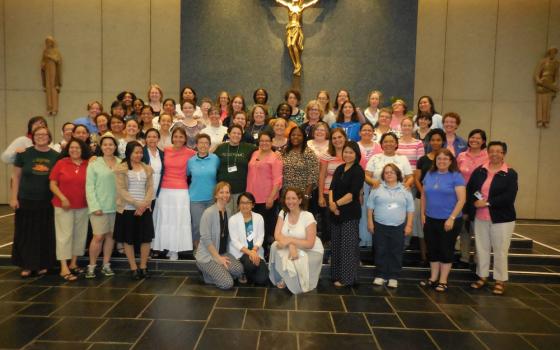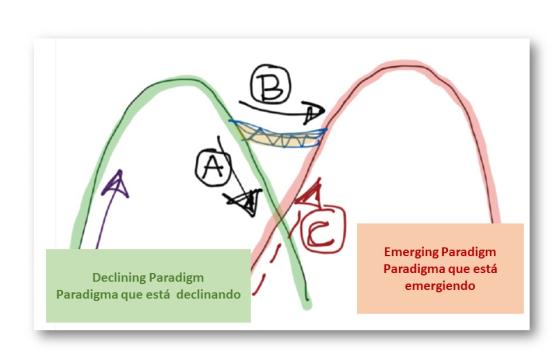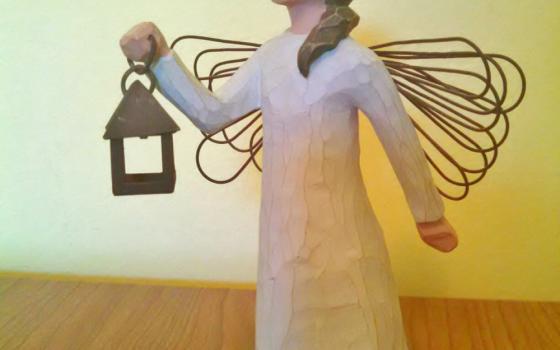"Blessed be God who filled my soul with fire."
Wednesday’s psalm antiphon (Psalm 66) proclaims what my heart feels after attending the Giving Voice National Gathering in Kansas City last weekend. The theme “Crossing Boundaries in Religious Life,” took shape through the more than 70 sisters under the age of 50 who gathered. Srs. Tere Maya and Sophia Park gave us much to ponder in their keynote addresses. Speaking about the generational and cultural dynamics at work in the church and in religious life today, they named realities that both affirm and challenge me as a young sister. The honest conversations were powerful kindling for the flame inside of me. Let me pass on some of that honesty.
Perhaps the most important movement for me, personally, was claiming my role in religious life with new passion. Tere’s presentation was entitled, “Younger Religious in the Time and Place we were Called to Live.” She explored the changing demographics of religious life, sharing with us many colorful graphs like the ones I am sure we have all seen at various congregational meetings. One of those was this:
This graph shows that one 40-year span of ages (60-100+) holds 90 percent of the space in religious life, and one 40-year span (20-59) holds about 10 percent. The teeny tiny slices of the pie representing those sisters who are 49 and under, which encompass most of the 70 women gathered this weekend, come to 4 percent. And I, at the age of 29, am part of a cohort that makes up only 1 percent of the whole. Even as our peers take leadership positions in their professions and enjoy the heights of their careers, the number of Giving Voice-aged people in congregational leadership would be a decimal of a percent. As we talked, we confirmed something I had not before named: We are on the margins of religious life. Conversations with my peers revealed some of the experiences that come from being in this minority position.
For many young sisters, their view point is always an outlier. They find themselves pushing against the status quo of the congregation to surface their dreams as part of the conversation. One young sister shared that sometimes she feels that her passion is suppressed or that her voice of challenge is unwanted. Other sisters feel that elder members of their congregations show curiosity about their perspectives, but it doesn’t go much further than that. If something is brought up that doesn’t fit into the older sister’s experience of religious life, the young person’s dreams may be dismissed. Other young sisters shared that their congregations have been wonderful about lifting up their voices and hearing them, but it is then difficult to garner support to make things happen. Congregations seem cautious about funneling real resources to fuel the God-given dreams of their new members.
Some young sisters feel that they are expected to carry on with business as usual. Older sisters wonder why the newer members do not want to work in this or that sponsored ministry that has been such a part of the congregation for so many years. The desired ministries of young sisters may be misunderstood as them “not wanting to work.” As I shared this sentiment with a co-worker the other day, he offered an insightful comparison. Perhaps, it is like when a family has owned a successful business, maybe a little restaurant, for many years. Great-Grandpa started it, Grandma ran it, and Dad took it over. It has been a wonderful place that has brought a lot of people together and touched a lot of lives. Now, the granddaughter is graduating from college, and she feels called to be a teacher. Her family wants her to take over the business instead. She loves her family, and she cherishes the family restaurant, but she knows that her path is to be something different. It wouldn’t be good for the granddaughter, or the restaurant, for that matter, to force her.
And so it is with new generations of sisters. We treasure the tradition and deeply admire all that our sisters have accomplished in the past. But in this time and place, our call is different. Some young sisters shared that when they bring forth an idea for a new initiative or direction in their congregations, the initial response of older members might be a resistant, “And how do I fit into this?” I understand that watching the “new” unfold might be painful for someone entering their elder years. They may fear division within the community between the “old” and the “new.” They may wish that they were younger. I know I will be there someday. But it doesn’t help the new to emerge if we all try to fit into the puzzle the same way. We must celebrate then new and know that we are a part of it because we are sisters.
Another of Tere’s slides will be of great help to this conversation:
I’ve seen a similar image before at one of our congregational gatherings in which we talked about the diminishment and new life occurring simultaneously in religious life. Tere took it a step further and discussed three types of leadership that are necessary in these changing times. At the “A,” there are those people who feel called to accompany, support and care for the people and issues associated with the paradigm on the “decline.” At the “B,” there are those people who act as a bridge between the old and the new. At the “C,” there are those people who are ushering in the emerging paradigm. Some sisters may identify strongly with one letter; often, we are at different letters at different times.
Looking at the graph, I thought about a phrase that comes up often in circles of women religious: “middle space.” It seems to be the phrase employed most often to describe where we are in the evolution of religious life. Nancy Schreck used the middle space image in her beautiful address at LCWR’s 2014 Assembly one year ago. She said, “We are in this middle space of the in-breaking of something new, of major shifts in world view, our cosmology, with the concurrent breakdown of so much of what is familiar.”
Although I hear where she and others who use the phrase are coming from, I have found it difficult to embrace the concept. This conference helped me to name why. Looking at religious life as a whole, yes, we are in a time of great transition. Paradigms are shifting, and A, B and C energies are all essentials to our current reality. But I personally am not in middle space! Nor should I be! The “familiar” that may be breaking down was never familiar to me. For me, this “new” paradigm of religious life is my religious life. I was made for this time and this place. I, and many of the Giving Voice sisters, am beyond middle space.
I am undoubtedly filled with “C” energy. And the emerging paradigm of the “C” is not something distant, faraway, coming in the proverbial future. It is a line on that graph, as crisp and bold as the descending line. Sure, we young sisters don’t know for sure all that is to be, but we can see some of it! Isn’t it true that each new generation can see a little bit further? The new is not fuzzy and unknown to me. It is here, and I am part of it! It is in me! I could not live any other way.
Tere Maya offered us an insightful affirmation, “Their questions are not your questions.” When she said this, I heard enlightened, grateful, “Ahhhs" throughout the room. By nature of the crossroads, there are big questions about property, care for aging sisters, sponsored ministries and more that must be pondered in religious life at this time. These are important. But the danger is that they can become the only questions. How freeing it was to hear that stated out loud: These may be the burning questions for the large generations in religious life, but they do not have to be yours! In fact, they shouldn’t be yours.
We have new questions to ask, questions that will help our congregations move forward. And we must ask them! It doesn’t devalue other questions. It doesn’t mean that we are abandoning our sacred past. But it ensures that we don’t get so comfortable in the middle space that we keep referring to the future as an ethereal, forthcoming moment and not something that is being revealed in our midst.
A word that surfaced in me frequently this weekend was reverence. It is the nature of evolution that some things pass away and new things come. Then, those things pass away, and new-new things come. Every movement is precious; every moment is of God. How can we be people who revere all of it? I am well aware that someday, I, too, will have to let go of what is familiar to me in order for those to come, who see further than I do, to usher in what they know to be true for their time and place. So, with deep respect, I reverence what has been. I revere the wisdom figures in our congregations and all they have brought to birth in the world. I revere their questions and their need for grieving. I am grateful for the ways they, and our congregations, are finding ways to revere the contributions of newer members as well. I reverence that we are all part of the same whole, not divided by differences in paradigm, but united in one body.
This weekend reminded me that I must, too, reverence my call, my questions, my passion, and my innate desire to create, explore and be a “C.” If I don’t, I am ignoring God’s spirit at work in me, and I am doing a disservice to my congregation, to the church and the world. I come forth from Giving Voice, en-couraged and em-powered to claim my role beyond the middle space! Can you hear me, Giving Voice sisters? Can you hear me, all sisters? This is our story, and we write it together by being who God calls us each to be.
Blessed be God who fills our souls with fire!
[Tracy Kemme is a Sister of Charity of Cincinnati. Author of the blog, Diary of a Sister-in-Training, Tracy is excited about the future of religious life! She currently ministers at the Catholic Social Action Office in Cincinnati and as the Latino Ministry Coordinator at a local parish.]




